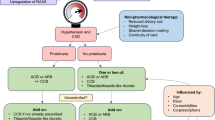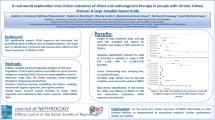Abstract
We investigated the interaction between chronic kidney disease (CKD) and high platelet reactivity (HPR) in determining long-term clinical outcomes following elective PCI for stable coronary artery disease (CAD). A total of 500 patients treated with aspirin and clopidogrel were divided based on the presence of CKD (defined as glomerular filtration rate of < 60 ml/min/1.73 m2) and HPR (defined as a P2Y12 reaction unit value ≥ 240 at VerifyNow assay). Primary endpoint was the occurrence of major adverse clinical events (MACE) at 5 years. Patients with both CKD and HPR showed the highest estimates of MACE (25.6%, p = 0.005), all-cause death (17.9%, p = 0.004), and cardiac death (7.7%, p = 0.004). The combination of CKD and HPR was an independent predictor of MACE (HR 3.12, 95% CI 1.46–6.68, p = 0.003). In conclusion, the combination of CKD and HPR identifies a cohort of patients with the highest risk of MACE at 5 years.


Similar content being viewed by others
References
Gansevoort, R. T., Correa-Rotter, R., Hemmelgarn, B. R., et al. (2013). Chronic kidney disease and cardiovascular risk: epidemiology, mechanisms, and prevention. Lancet., 382, 339–352.
Sarnak, M. J., Amann, K., Bangalore, S., et al. (2019). Chronic kidney disease and coronary artery disease: JACC state-of-the-art review. Journal of the American College of Cardiology, 74, 1823–1838.
Mehran, R., Nikolsky, E., Lansky, A. J., et al. (2009). Impact of chronic kidney disease on early (30-day) and late (1-year) outcomes of patients with acute coronary syndromes treated with alternative antithrombotic treatment strategies: an ACUITY (Acute Catheterization and Urgent Intervention Triage strategY) substudy. JACC. Cardiovascular Interventions, 2, 748–757.
Tsai, T. T., Messenger, J. C., Brennan, J. M., et al. (2011). Safety and efficacy of drug-eluting stents in older patients with chronic kidney disease: a report from the linked CathPCI Registry-CMS claims database. Journal of the American College of Cardiology, 58, 1859–1869.
Angiolillo, D. J., Bernardo, E., Capodanno, D., et al. (2010). Impact of chronic kidney disease on platelet function profiles in diabetes mellitus patients with coronary artery disease taking dual antiplatelet therapy. Journal of the American College of Cardiology, 55, 1139–1146.
Htun, P., Fateh-Moghadam, S., Bischofs, C., et al. (2011). Low responsiveness to clopidogrel increases risk among CKD patients undergoing coronary intervention. J Am Soc Nephrol., 22, 627–633.
Morel, O., El Ghannudi, S., Jesel, L., et al. (2011). Cardiovascular mortality in chronic kidney disease patients undergoing percutaneous coronary intervention is mainly related to impaired P2Y12 inhibition by clopidogrel. Journal of the American College of Cardiology, 57, 399–408.
Motovska, Z., Odvodyova, D., Fischerova, M., et al. (2012). Renal function assessed using cystatin C and antiplatelet efficacy of clopidogrel assessed using the vasodilator-stimulated phosphoprotein index in patients having percutaneous coronary intervention. The American Journal of Cardiology, 109, 620–623.
Muller, C., Caillard, S., Jesel, L., et al. (2012). Association of estimated GFR with platelet inhibition in patients treated with clopidogrel. American Journal of Kidney Diseases, 59, 777–785.
Gremmel, T., Müller, M., Steiner, S., et al. (2013). Chronic kidney disease is associated with increased platelet activation and poor response to antiplatelet therapy. Nephrology, Dialysis, Transplantation, 28, 2116–2122.
Viviani Anselmi, C., Briguori, C., Roncarati, R., et al. (2013). Routine assessment of on-clopidogrel platelet reactivity and gene polymorphisms in predicting clinical outcome following drug-eluting stent implantation in patients with stable coronary artery disease. JACC. Cardiovascular Interventions, 6, 1166–1175.
Mangiacapra, F., Cavallari, I., Barbato, E., et al. (2014). Impact of chronic kidney disease on platelet reactivity and outcomes of patients receiving clopidogrel and undergoing percutaneous coronary intervention. The American Journal of Cardiology, 113, 1124–1129.
Breet, N. J., de Jong, C., Bos, W. J., et al. (2014). The impact of renal function on platelet reactivity and clinical outcome in patients undergoing percutaneous coronary intervention with stenting. Thrombosis and Haemostasis, 112, 1174–1181.
Baber, U., Mehran, R., Kirtane, A. J., et al. (2015). Prevalence and impact of high platelet reactivity in chronic kidney disease: results from the Assessment of Dual Antiplatelet Therapy with Drug-Eluting Stents registry. Circulation. Cardiovascular Interventions, 8, e001683.
Mavrakanas, T. A., Alam, A., Reny, J. L., & Fontana, P. (2018). Platelet reactivity in stable cardiovascular patients with chronic kidney disease. Platelets., 29, 455–462.
Wu, Y., Song, Y., Pan, Y., Gong, Y., & Zhou, Y. (2019). High on-clopidogrel platelet reactivity and chronic kidney disease: a meta-analysis of literature studies. Scandinavian Cardiovascular Journal, 53, 55–61.
Stone, G. W., Witzenbichler, B., Weisz, G., et al. (2013). Platelet reactivity and clinical outcomes after coronary artery implantation of drug-eluting stents (ADAPT-DES): a prospective multicentre registry study. Lancet., 382, 614–623.
Aradi, D., Kirtane, A., Bonello, L., et al. (2015). Bleeding and stent thrombosis on P2Y12-inhibitors: collaborative analysis on the role of platelet reactivity for risk stratification after percutaneous coronary intervention. European Heart Journal, 36, 1762–1771.
Mangiacapra, F., Cavallari, I., Ricottini, E., Pellicano, M., Barbato, E., & Di Sciascio, G. (2015). High platelet reactivity and periprocedural myocardial infarction in patients undergoing percutaneous coronary intervention: A significant association beyond definitions. International Journal of Cardiology, 190, 124–125.
Mangiacapra, F., Colaiori, I., Ricottini, E., et al. (2018). Impact of platelet reactivity on 5-year clinical outcomes following percutaneous coronary intervention: a landmark analysis. Journal of Thrombosis and Thrombolysis, 45, 496–503.
Levey, A. S., Bosch, J. P., Lewis, J. B., Greene, T., Rogers, N., & Roth, D. (1999). A more accurate method to estimate glomerular filtration rate from serum creatinine: a new prediction equation. Modification of Diet in Renal Disease Study Group. Annals of Internal Medicine, 130, 461–470.
Levey, A. S., Coresh, J., Balk, E., et al. (2003). National Kidney Foundation practice guidelines for chronic kidney disease: evaluation, classification, and stratification. Annals of Internal Medicine, 139, 137–147.
Mangiacapra, F., De Bruyne, B., Muller, O., et al. (2010). High residual platelet reactivity after clopidogrel: extent of coronary atherosclerosis and periprocedural myocardial infarction in patients with stable angina undergoing percutaneous coronary intervention. JACC. Cardiovascular Interventions, 3, 35–40.
Mangiacapra, F., Barbato, E., Patti, G., et al. (2010). Point-of-care assessment of platelet reactivity after clopidogrel to predict myonecrosis in patients undergoing percutaneous coronary intervention. JACC. Cardiovascular Interventions, 3, 318–323.
Mangiacapra, F., Patti, G., Barbato, E., et al. (2012). A therapeutic window for platelet reactivity for patients undergoing elective percutaneous coronary intervention: results of the ARMYDA-PROVE (Antiplatelet therapy for Reduction of MYocardial Damage during Angioplasty-Platelet Reactivity for Outcome Validation Effort) study. JACC. Cardiovascular Interventions, 5, 281–289.
Hicks, K. A., Tcheng, J. E., Bozkurt, B., et al. (2015). 2014 ACC/AHA Key Data Elements and Definitions for Cardiovascular Endpoint Events in Clinical Trials: A Report of the American College of Cardiology/American Heart Association Task Force on Clinical Data Standards (Writing Committee to Develop Cardiovascular Endpoints Data Standards). Journal of the American College of Cardiology, 66, 403–469.
Thygesen, K., Alpert, J. S., Jaffe, A. S., et al. (2018). Fourth Universal Definition of Myocardial Infarction (2018). Journal of the American College of Cardiology, 72, 2231–2264.
Cutlip, D. E., Windecker, S., Mehran, R., et al. (2007). Clinical end points in coronary stent trials: a case for standardized definitions. Circulation., 115, 2344–2351.
Rao, A. K., Pratt, C., Berke, A., et al. (1988). Thrombolysis in Myocardial Infarction (TIMI) Trial--phase I: hemorrhagic manifestations and changes in plasma fibrinogen and the fibrinolytic system in patients treated with recombinant tissue plasminogen activator and streptokinase. Journal of the American College of Cardiology, 11, 1–11.
Scholz, S. S., Lauder, L., Ewen, S., et al. (2019). One-year clinical outcomes in patients with renal insufficiency after contemporary PCI: data from a multicenter registry. Clinical Research in Cardiology.
Capodanno, D., & Angiolillo, D. J. (2012). Antithrombotic therapy in patients with chronic kidney disease. Circulation., 125, 2649–2661.
Morel, O., Muller, C., Jesel, L., Moulin, B., & Hannedouche, T. (2013). Impaired platelet P2Y12 inhibition by thienopyridines in chronic kidney disease: mechanisms, clinical relevance and pharmacological options. Nephrology, Dialysis, Transplantation, 28, 1994–2002.
Mangiacapra, F., Panaioli, E., Colaiori, I., et al. (2016). Clopidogrel versus ticagrelor for antiplatelet maintenance in diabetic patients treated with percutaneous coronary intervention: results of the CLOTILDIA study (Clopidogrel High Dose Versus Ticagrelor for Antiplatelet Maintenance in Diabetic Patients). Circulation., 134, 835–837.
Mangiacapra, F., Di Gioia, G., Pellicano, M., et al. (2016). Effects of Prasugrel Versus Clopidogrel on Coronary Microvascular Function in Patients Undergoing Elective PCI. Journal of the American College of Cardiology, 68, 235–237.
Mangiacapra, F., Pellicano, M., Di Serafino, L., et al. (2018). Platelet reactivity and coronary microvascular impairment after percutaneous revascularization in stable patients receiving clopidogrel or prasugrel. Atherosclerosis., 278, 23–28.
Sibbing, D., Aradi, D., Alexopoulos, D., et al. (2019). Updated Expert Consensus Statement on Platelet Function and Genetic Testing for Guiding P2Y12 Receptor Inhibitor Treatment in Percutaneous Coronary Intervention. JACC. Cardiovascular Interventions, 12, 1521–1537.
Author information
Authors and Affiliations
Contributions
All authors contributed to the study conception and design. Material preparation, data collection, and analysis were performed by Fabio Mangiacapra, Alessandro Sticchi, Edoardo Bressi, Michele Mattia Viscusi, Iginio Colaiori, Elisabetta Ricottini, and Ilaria Cavallari. The first draft of the manuscript was written by Fabio Mangiacapra and Alessandro Sticchi, and all authors commented on previous versions of the manuscript. All authors read and approved the final manuscript.
Corresponding author
Ethics declarations
Conflict of Interest
The authors declare that they have no conflict of interest.
Ethical Approval
All procedures performed in this study involving human participants were in accordance with the ethical standards of the institutional Ethics Committee and with the 1964 Helsinki declaration and its later amendments or comparable ethical standards.
Informed Consent
Informed consent was obtained from all individual participants included in the study.
Additional information
Associate Editor Angela Taylor oversaw the review of this article
Publisher’s Note
Springer Nature remains neutral with regard to jurisdictional claims in published maps and institutional affiliations.
Rights and permissions
About this article
Cite this article
Mangiacapra, F., Sticchi, A., Bressi, E. et al. Impact of Chronic Kidney Disease and Platelet Reactivity on Clinical Outcomes Following Percutaneous Coronary Intervention. J. of Cardiovasc. Trans. Res. 14, 1085–1092 (2021). https://doi.org/10.1007/s12265-021-10126-8
Received:
Accepted:
Published:
Issue Date:
DOI: https://doi.org/10.1007/s12265-021-10126-8




